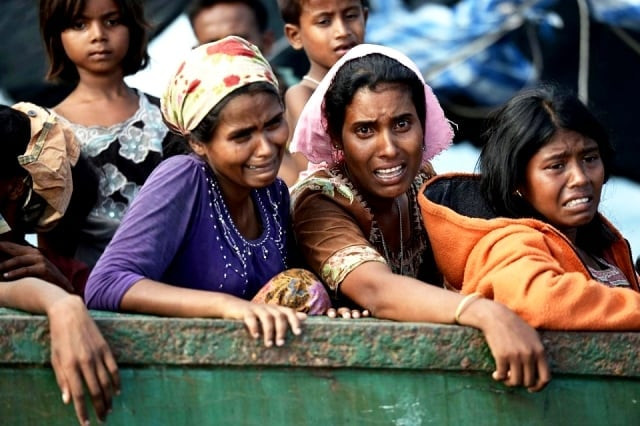This is probably the most dragging, prolonged episode of persecution and genocide in modern history, the worst of its kind since the holocaust even. I’m talking about the Rohingya catastrophe – a story of blatant hatred, spite and animosity.
Regrettably, I never dug deep enough into the origin of the Rohingyas. I did, however, come across an article called The Muslim Rohingya of Burma dating back to 1995 that gathers about as much of the historical record as exists in written form.
The term Rohingya appears to be an invention of around 1960s, adopted as a means of organising resistance or protest or demands for recognition and acceptance of Muslims of Rakhine province as Burmese citizens.
The author of the above-referenced piece has provided evidence that an indigenously Burmese Muslim population evolved in Arakan (Rakhine Province) between the 10th and 16th centuries. It was not a large population back then, but in modern times, post-Burmese independence, with natural population growth, it has perhaps increased to as much as one or one and a half million people. The competing groups, the Burmese Buddhist nationalists and the Burmese Muslims from Rakhine province developed different narratives, some of which is myth or invention. But there is no doubt that the mainstream Burmese do not like the Muslims and do not regard them, or at least most of them, as real citizens of the Burmese nation.
Factor all of the above into the present and fast-forward to now; finding no love in Burma, the Rohingyas have been compelled to act on their own and explore any number of ways to extricate out of the quagmire.
In 2009, a senior Burmese envoy to Hong Kong branded the Rohingyas “ugly as ogres”.
The Rohingya people have been described as “among the world’s least wanted”.
This is “one of the world’s most persecuted minorities”.
Whereas their past is all messed up, the Rohingya’s present and future seems even bleaker. Looking at what’s going on at the moment, makes one teary. While the Rohingyas have no incentives in terms of money or oil to offer to the countries that they are seeking refuge in, a tacit effort is being made to help. Yet, when one goes through pages after pages of this deadly chaos, an all-out, non-discriminatory vision to pull this nation out of grief is clearly missing in action.
Ironically, Malaysia, a country where a high number of Rohingyas have ended up, refuses to help the refugees. Last week the Malaysian deputy home minister was heard saying,
“We have to send the right message that they are not welcome here.”
Really? I asked myself.
Is the right message not to help those in need and who knock on your door begging for support? This is the same country that recently sent its troops to help the Saudis against the Yemenis. Of course, the reason for rushing to aid the ‘brothers-in-arms’ was because the stakes were high and the Arab Sheikhs promised lots of financial rewards.
While Amnesty International is trying to raise awareness, muster support for those who made it out of the Burmese concentration camps, what really hits one right in the face is the alarming silence of the Burmese pro-democracy activist and Nobel Peace prize winner Aung San Suu Kyi.
Where did her commitment to freedom go? What happened to her allegiance to human rights? Someone told me, unlike Christianity, Buddhism doesn’t believe in rights for non-citizens. If that is the case, Suu Kyi, being a Buddhist, the premise of awarding her the esteemed prize was utterly flawed.
While the rest of the world leaders have kept mum, President Barack Obama spoke in favour of the Rohingyas during his visit to Burma last year. Sadly, beyond the president’s outright call to resolve the Rohingya crisis, US policy-makers have failed to follow up to end this modern form of apartheid.
The Rohingya genocide is an everyday affair. While mass graves have been found in various parts of Asia Pacific, my Jewish friends say that the Burmese military seems to have a Nazi-like racist mind-set. Given the Burmese anti-Islam, anti-Muslim sentiment, it is not entirely surprising that the situation has come to a point where the Burmese regime can no longer handle it. Evidently, sifting through the information available on the subject, the Rohingyas are being targeted just because of their Islamic faith.
What’s being ignored is the bottom line – the mother of all realities – we are all human beings and need not suffer because of how we look or our names or where we come from. What matters in the end is how we behave and treat our fellow beings. The peace and respect part of life is the basic tenet and value of our existence.
The Rohingya issue is global in nature which the powers-that-be will have to tackle sooner rather than later. Perhaps it is time for the UN secretary general to step up to the plate and instead of merely expressing concerns, do some much-needed networking, take action and make the Rohingya affair a part of his legacy. The Rohingya refugees are not a certain country or a particular region’s headache. It’s a bleeding wound, one that should be nursed immediately, without considerations of political divisions or interests. It’s an appeal to the collective human conscience.
As I end this piece, I feel terribly let down after having read what is happening with the Shias in Pakistan. Makes me wonder if they are the Rohingyas of the ‘land of the pure’. Ironically, Shias are Muslims and they are being persecuted in an ‘Islamic republic’. Can it get any worse than that?
Dare I say that the Burmese atrocities on the Rohingyas pales in front of the treatment meted out to the minorities in Pakistan?



COMMENTS
Comments are moderated and generally will be posted if they are on-topic and not abusive.
For more information, please see our Comments FAQ